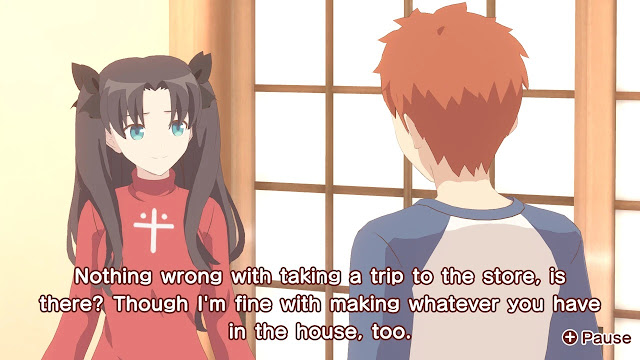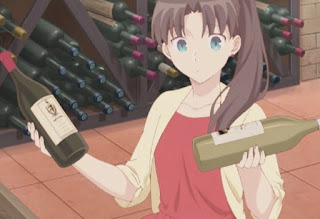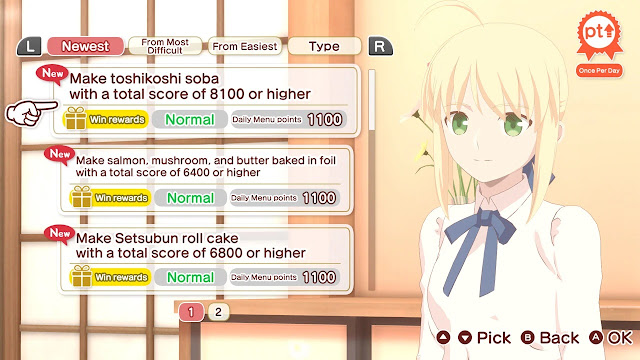It’s quite incredible to consider just how far the Fate series has come. It started out as a single niche visual novel with some roaring-good sex scenes (which, to this day, has never been formally localised into English) and has grown to become a major multimedia property, spanning popular anime, films, mobile RPGs, Musou-like warriors games, a massive range of high-quality figures, and so much more. Of all of it, the anime Today’s Menu For Emiya Family has got to be my favourite. It features all the major characters from the anime, but instead of all the fighting and bloodletting that they get up to in the “proper” series, in Today’s Menu For Emiya Family they instead… cook. This new Switch title, Everyday Today’s MENU for EMIYA Family, offers that exact same thing, and it’s just the most wholesome little experience.
Everyday Today’s MENU for EMIYA Family is a part visual novel, part recipe book, and part minigame compilation. In the visual novel section, each of the three girls in the cast chat with the main man, Shirou Emiya, to decide what seasonally appropriate thing they want to cook (with the game’s various episodes being split down seasonal lines). In each chapter, you’ll be asked to make one dialogue decision, which will affect which chapter unlocks next, and after that, you get down to the cooking.
What I immediately loved about Everyday Today’s MENU for EMIYA Family is that before the minigames start, you’ll get to see the actual recipe to make the dish in the real world. If you succeed at completing the minigame challenges, you unlock the recipe for use outside of the game. This “gallery” is, quite literally, a functionally useful cookbook, giving you all the knowledge that you need to cook up many of the favourite and traditional recipes of Japan. The instructions are clear and efficient, and there are recipes in there for real-world cooks of all talent levels. Name one other game where the big reward is a cookbook that, thanks to the Switch’s portability, you can refer to in the kitchen as you actually cook. It’s a brilliant value-add to the game itself, I tell you what.
The Japanese love food, and over many hundreds and thousands of years have developed a food culture that is downright philosophical. So many dishes have particular relevance or reflection on real-world seasons or events, and Japanese food culture is, typically, about communal eating and sharing, the experience of which covers a gamut of cultural philosophies from manners to rhetoric. It’s actually one of the big differences in Japanese culture that I’ve noticed in my travels. Australians love food too, of course, and from meat pies to BBQs we have national favourites and foods that we enjoy in a social atmosphere. The Japanese elevate it, though. For just one example, the Japanese have a food tradition of bento (lunch) boxes that you buy when getting on a train for a lengthy trip, and these boxes (they’re called ekiben) have carefully selected ingredients that are designed to highlight the local area’s produce, and represent the journey itself in the abstract. Get on a long-distance train in Australia and lunch is – I say this with no exaggeration whatsoever – “roast beef” which has turned into slop thanks to being tinfoil wrapped and stewed a heater for too long, and a stale bread roll. In Japan, there’s a thousand-year tradition of eating osechi-ryōri at New Years, and these immaculate boxes of food take 2-3 days to prepare. There’s just nothing that compares to that in western culture.
Not that this is meant to be a cultural comparison. The point I’m making here is that simply by focusing on cooking and food, this game touches on something of deep and abiding relevance to the very core of Japanese culture. The visual novel segments themselves are light-on, it must be said, but by simply providing those recipes, the game very much encourages its players to get hands-on with something that means a great deal to these people (it also helps that the game renders the food so beautifully it’s mouth-watering to even look at). So basically you come for Rin Tohsaka, and stay because the girl’s going to learn you some culture while she’s at it.
Beyond the food renders, the core themes of Emiya Family is supported by art direction that makes the characters and setting beautiful. And I don’t just mean Rin Tohsaka here (though she really is so pretty I just melt every time I see her). The light pastel aesthetic that is so distinctive, warm, and inviting in the anime has been converted into 3D for this game, and while the loading times are lengthy, they’re worth it, because I’m really struggling to think of a game that is so purely wholesome as this is. The series is fan service (no I don’t mean swimwear, I mean in the context of “something made for fans”), and on that basis it’s a good idea to have a working knowledge of the characters going in, but the wholesome warmth that radiates from the game is a universal thing. To be clear – aside from the presence of the characters, nothing about Emiya Family is related to the rest of the Fate series (there’s no fighting, after all), and yet you’ll walk away from your time playing this game loving these characters so much more.

Over on the side of gameplay, Emiya Family is light, but executed perfectly. Each of those complex recipes that you’re given to cook in the real world are abstracted down to being represented by a handful of minigames drawn from a total roster of eight. You might need to chop things, or control the heat as something cooks on the stove. Another minigame involves boiling things, and so on and so forth. Each of these minigames is different enough, and are single-action events that are over in less than a minute. Depending on how you perform in those minigames, you’ll get points, and then after running through all the minigames for that dish (between two and four for the most part), you’ll then be graded between one and three “hearts”. It really is a perfect and appropriate abstraction of the cooking process and it had me right into the spirit of the activity every single time.
At first, it’s all going to seem so simple, with the minigames almost impossible to fail. That impression doesn’t last long. By the time you’re five or six chapters in, getting a score high enough to get the three heart ratings starts to feel impossible. This brings me to my one and only complaint with Emiya Family; getting better scores is a grind. Whichever girl you’re cooking with gets experience points after every attempt at cooking, and eventually unlocks additional skills that makes it easier to tally up big scores. I know from personal experience that repetition is kind of core to getting good at cooking (I, quite genuinely, nearly started a fire from overcooking instant noodles once, but these days I can make decent curries and such from scratch), but with the minigames being so mechanically simple, I didn’t need the developers to gamify that repetition into this experience. I appreciate that this is where the padding comes in that justifies the high price for the game in the minds of the gamers, but I would have been more than content with simply unlocking all the recipes (a few hour’s worth of different dialogue tree decisions), and earning three hearts on a balanced difficulty curve.
Still, insofar as raw content goes, there’s more than enough in Emiya Family. In addition to unlocking all the recipes, there are daily challenges (an effective way to grind up experience), and plenty of little costume bonuses and the like as well. Admittedly I haven’t unlocked anything, but I figure Rin in a bikini or going apron-only will not be unlockable costume options (and in fairness, as much as I’d love it it would undermine the game’s sweetly innocent tone). Finally, as you play you also unlock beautifully wistful little photos, and there’s a character viewer that lets you take basic screenshots (it needed a photo mode, to be frank). All that art makes for great Instax Mini printing and scrapbooking. It’s genuinely impressive just how full-featured this game is, given how easy it would have been for the developers to go the other way completely with the limited gameplay loops they were working with.
Everyday Today’s MENU for EMIYA Family is such a beautiful, wholesome, heart-warming thing. It so effectively celebrates a quality of Japanese culture that goes so much deeper than “raw fish” (you have no idea how many people STILL ask me “what can you even eat over there?!?” when they discover that I have a seafood allergy), and it also highlights just how potent the Fate property has become, that this most tangential of tangent spinoff series could end up with something so perfectly pleasant to play. Also. Rin is just so freaking pretty.
– Matt S.
Editor-in-Chief
Find me on Twitter: @mattsainsb









